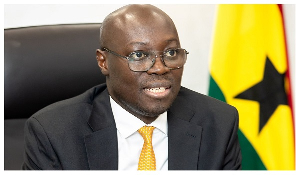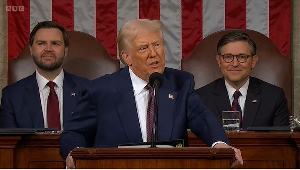Accra, March 30, GNA - Mr Joseph Yieleh Chireh Minister of Local Government and Rural Development on Monday called for the establishment of linkages between rural housing and urban development to curb the incidence of rural urban migration the country is currently experiencing. He said urbanization had brought numerous challenges such as sprawling cities, lack of proper planning, clear segregation of urban population into urban poor and the urban rich posing great difficulties to government.
Speaking at the opening of a two-day conference on "Promoting the Urban Agenda: Meeting the Challenges of Urbanisation and Poverty in Ghana and Africa", the Minister said government would strengthen the capacities of institutions that were directly involved in urban planning to tackle the various problems of planning in Ghana. He said government's policy on rural housing would make land available for housing in partnership with traditional owners, provide technical assistance and access to low-cost building methods, provide wall protection and roof loans schemes, support cooperative and trade associations to assist in housing provision policy and involve communities in planning, setting standards and ensuring compliance. The conference is being organized by the Cooperative Housing Foundation (CHF) in collaboration with the Institute of Local Government Studies (ILGS) to deepen the knowledge and practice of urban development and poverty reduction.
The conference brings together urban development practitioners, policy formulators, local government functionaries, researchers, academicians and civil society to consider how best to promote urban development within the local national policy agenda. Mr Yileh Chireh said "An integrated and holistic approach to solving the myriad of problems that urbanisation brings is what we as civil society organizations, non-governmental organizations, stakeholders and government need to recommit ourselves to tackle".
Dr Esther Offei-Aboagye, Director of the ILGS said urban development was one area that the Institute intended to step up work and had vivid ambitions after 10 years of existence. She said the Institute intended to undertake projects like Geographic Information Systems Initiative, the establishment of an Urban Observatory, development of a series of programmes in urban development and examine the prospects for the establishment of Urban Study/Working Groups.
These, she said would explore the relationship between the decentralization and urbanization, define the knowledge gaps and capacity building imperatives arising from the nexus of decentralization and urbanization, and identify thematic areas in urban development for study including land-use issues.
Mr Brain English, a representative of CHF said more than one billion people lived in slums around the world, which was expected to grow to two billion within a couple of decades.
He noted that the sharp increase in urban poverty threatened the stability and well being of literally billions of people, adding, "although less urbanized than other regions of the world, Africa is experiencing rapid rates of urbanization".
In 2005, about 48 per cent of Ghana's population lived in urban areas, which is over 10 million. By 2025, this number is projected to reach 63 per cent of the population, which would almost be 20 million people.
The distribution of this urbanisation population was heavily skewed to Accra, Kumasi, Sekondi-Tarkoradi and Tamale, which accounted for 44 per cent of urban population.
Mr English said despite the challenge, Ghana was demonstrating successful ways of tackling the complex problems emanating from urbanization in the various communities. 30 March 09
General News of Monday, 30 March 2009
Source: GNA
















